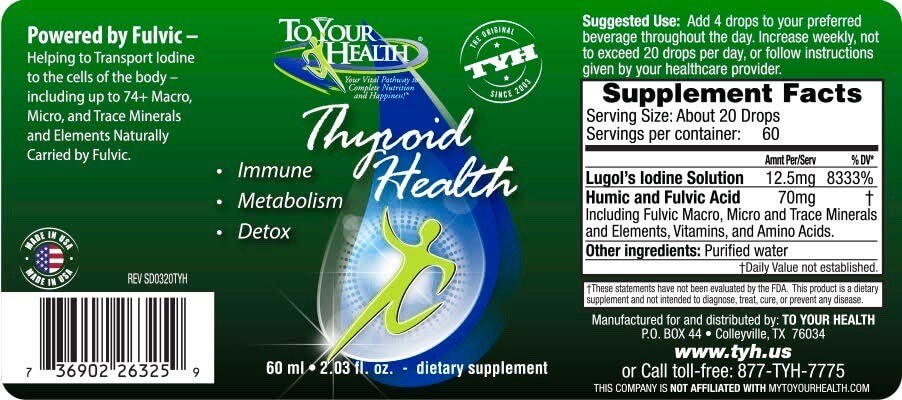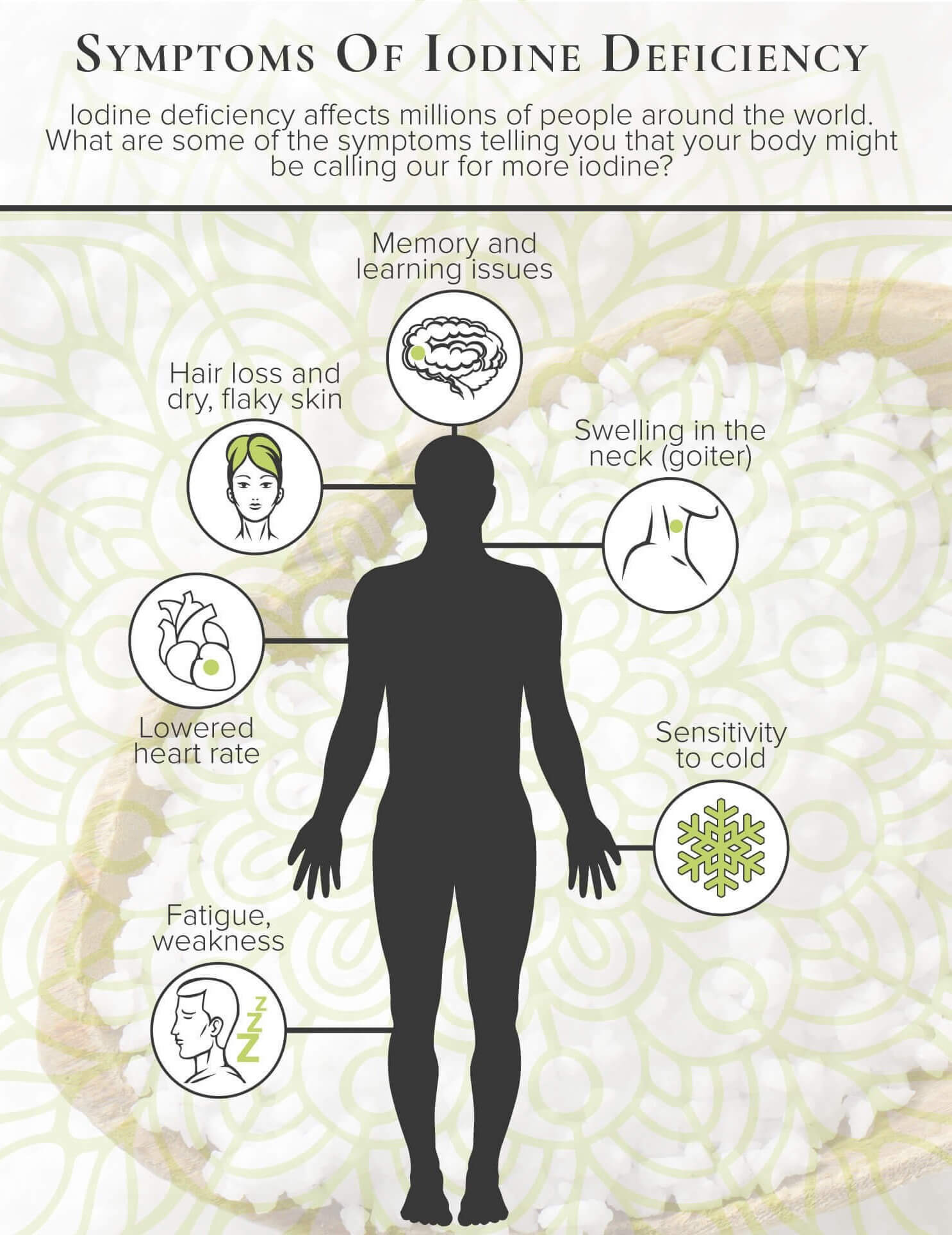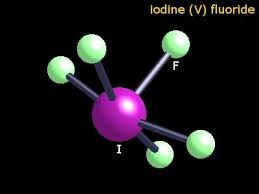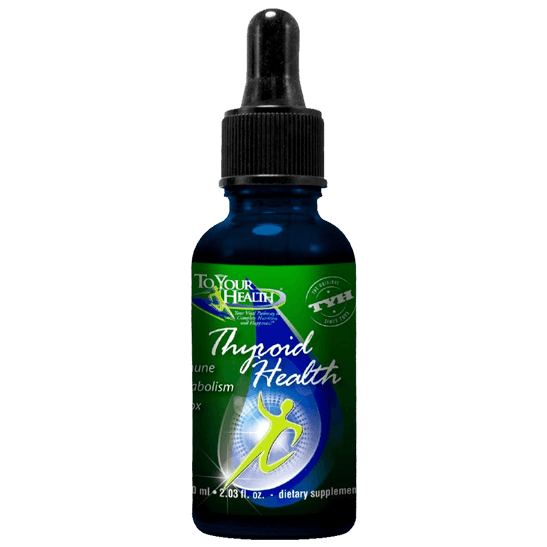Description
ORGANIC & NON-GMO * GLUTEN & SOY FREE * VEGETARIAN FRIENDLY *VEGAN FRIENDLY

Why is Iodine so Important?
Iodine is a nutrient needed by every part of the body and one we’re often deficient in. Lugol’s Iodine provides an ideal ratio of both forms of iodine needed by the body missing in other Iodine supplements including nascent iodine. Complete your essential daily routine with this missing element in both its active forms!
60% of the iodine in your body is in your thyroid, and your thyroid uses iodine to create the thyroid hormones T3 and T4. Put simply, these two hormones help regulate your energy levels, mental clarity, memory, mood, metabolism, weight, and everything in between. The thyroid is your body’s engine, and iodine is the battery – when you’re low on iodine, everything slows down.
There’s good news!
Thyroid Health’s Lugol’s Iodine can help eradicate iodine deficiency and help you regain energy and a healthy metabolism!
Lugol’s Iodine
TO YOUR HEALTHS’ Lugol’s Iodine offers the well-known and trusted proprietary blend of iodine and iodide, but we’ve augmented this with fulvic acid to enhance absorption and delivery to cells.
Did you know that current studies suggest up to 90% of Americans may be deficient in iodine, and that the recommended daily intake is only enough to prevent disease? Our formula offers the natural health gold standard dosage of 12.5 mg of iodine/iodide, and since it’s a liquid formula, you can tailor your dose to fit specific health needs.

Product Highlights
- Iodine is one of the most needed elements in the entire body
- Common Symptoms of Iodine Deficiency include lower than normal body temperature (especially measured first thing in the morning), lack of weight control or difficulty losing weight, a sparse outer third of the eyebrows, dry skin and cracked heels, lack of energy, and foggy thinking.
- Iodine helps make us smarter, especially in regards to fetal mental and IQ development. It promotes sharp thinking, mental focus, cognitive function, and the elimination of brain fog in adults.
- Offers powerful antiviral, antibacterial, antifungal, and antiparasitic properties.
- Iodine sufficiency may offer protective anti-carcinogenic hormone regulation support important for healthy breast, prostate, uterine, ovarian, and cervical cells and tissues.
- Helps detoxify halide concentrations caused by fluoride, chlorine, and bromine as well as helping to prevent lead and other metals from being stored in the body.
- Lugol’s Iodine is an essential mineral that supports thyroid health and well-being for the body.
- Lugol’s iodine boosts healthy iodine levels to help support cognitive functions.
- Lugol’s iodine may support healthy hormone levels to stabilize your vitality.
- Lugol’s iodine may be involved in maintaining healthy metabolism to keep you going as long as necessary.
- Supplementing with iodine may help your body reach optimal iodine levels so you don’t have to reach it from impure sources.

Ingredient Highlights
- Lugol’s Iodine is the most well-known and trusted iodine on the market.
- It offers duel benefits from both iodine and potassium iodide in a balanced ratio shown to help reduce the occurrence of disease and promote healthy biological function throughout the body.
- Different tissues in the body prefer one form of iodine over the other. This tissue specific support is only provided by Lugol’s Iodine.
- Our unique blend also includes fulvic acid to help increase absorption and delivery into the cells.
Shocking Iodine Statistics
- According to the World Health Organization’s Department of Nutrition for Health and Development, iodine deficiency is a public health problem in 54 countries where impure iodine sources are plentiful.
- The CDC states that iodine deficiency is one of the four major deficiency diseases in the world.
- The 2013 USGS iodine commodity summary warns that there are no comparable substitutes for iodine that will match its benefits.
- Information published by UNICEF notes that iodine deficiency is the most avoidable cause of stunted physical and intellectual development.
DIRECTIONS
We recommend starting with 2 drops twice a day for the first week. Increase this dose by 2 drops twice a day each week thereafter. Consult with your healthcare professional before starting an iodine supplement. Always mix with non-chlorinated water.
Example:
- Week 1: 2 drops twice per day mixed in 4 ounces of water
- Week 2: 4 drops twice per day mixed in 4 ounces of water
- Week 3: 6 drops twice per day mixed in 4 ounces of water
- Week 4: 8 drops twice per day mixed in 4 ounces of water
- Week 5: 10 drops twice per day mixed in 4 ounces of water
(Continue this dose daily for maintenance)

Did You Know It’s Been Estimated That Over 90% Of The United States Population Is Iodine Deficient And Up To 74% Are Severely Deficient?
*This is based on clinical findings and national studies (NHANES I, 1974, AND NHANES II, 2000) by the Centers for Disease Control and Prevention (CDC) designed to assess the ongoing health and nutritional status of adults and children in the U.S. Experts – Drs. Abraham, Brownstein, and Flechas – tested iodine levels in over 35,000 patients.
Iodine in its various forms is such an important element in the body, and it has many jobs to do. It is involved in immunity, metabolism, energy production, fetal and early childhood cognitive development, and hormone production. It is also required for the conversion of carcinogenic estrogen and progesterone hormone metabolites, heavy metal and radiation detoxification, and so much more.
For over 200 years, medical practitioners have been using iodine for a wide variety of reasons, and was once considered the universal medicine. In the early 1900s, iodine was shown to be able to treat goiter. In Michigan and Ohio, studies conducted in the early 1920s on school children showed 40% had an enlargement of the thyroid gland or goiter. It was found that treatment with just a small amount of iodine caused goiters to go away. By 1982, there was a 75% reduction in goiter in the area. The addition of iodine to table salt was a direct result of these studies, but despite the wide use of iodized salt, goiters are still around today.
Can Iodized Salt Really Provide Enough Iodine?
The amount of iodine in iodized salt is not sufficient to meet the extensive needs of the entire body. Remember, our thyroids are not the only part of our bodies that use iodine. In fact, every cell in our bodies uses iodine.
In every gram of salt, there are 77 micrograms of iodine and the average daily intake of salt is 5 grams – 385 micrograms of iodine. Unfortunately, only about 10% of this iodine is bioavailable according to urine tests, but medical schools still teach that iodine in salt is adequate. Today, sea salt is quickly becoming a preferred alternative, but even this contains very little iodine.
The current recommended daily amount (RDA) of iodine is 150-220 micrograms per day and was developed in 1924 from the findings of goiter prevention studies. This means the RDA is only enough to help prevent goiter, but it is not typically sufficient to cover the needs of the entire body. It is inadequate because our bodies need about 100 times this RDA just to produce iodolactone (a required substance for normal cell apoptosis) and it is certainly not enough to help prevent cancer.
Our thyroids alone require 5-7 milligrams (5000-7000 micrograms) each day of iodine. Breast tissue and reproductive tissues require similar amounts and without adequate iodine, these tissues can develop fibroids. Just based on this, it becomes clear that the current RDA is outdated and likely not enough for most individuals. As a result, many healthcare practitioners are now using 12.5 milligrams as the standard daily adult supplementation.
Iodine intake is highly individualized and some people, such as those with autoimmune thyroid diseases, should not take iodine supplements. This is why working with a healthcare practitioner and doing regular iodine testing is always recommended to help determine an individual’s iodine level.
Deficiencies
How can a lack of iodine affect processes in the human body?
- Energy Production and Metabolism
Iodine is required to synthesize thyroid hormones that regulate metabolism, oxygenations, and energy production. When we are iodine deficient, we can feel sluggish and fatigued.
Patients taking thyroid hormones may also need to take an iodine supplement because these hormones can increase the body’s need for iodine. Disorders that involve iodine deficiencies may worsen or become more prevalent, such as the incidence of breast, prostate, and thyroid cancers.
- Weight Management
Through the production of thyroid hormones, iodine helps prevent metabolic weight gain and fires up metabolism increasing caloric burn. Without adequate iodine intake, these thyroid hormones cannot be produced.
- Hormone Balance and Cancer
Iodine works in the production and balance of all hormones, not just thyroid, and balance is key for disease prevention. It helps regulate and balance estrogen production in female ovaries and adrenal tissues in men that can stimulate the development and progression of hormone-related cancers, such as breast, ovarian, uterine, and prostate cancers.
Estrogen dominance in both men and women is dramatically increased in iodine-deficient hypothyroid states and appears to be a significant risk factor in the development of hormone-related cancers. The incidence of these cancers and others such as stomach, lung, esophagus, thyroid, and throat cancers are markedly increased in iodine-deficient patients
Goiter, an enlargement of the thyroid gland due to iodine deficiency, has a direct relationship with the breast and prostate cancers. Two studies done in Iceland and Japan — populations with high iodine intake — have significantly lower incidences of these diseases compared to other populations.
Finally, iodine helps prevent fibrocystic breast diseases and is successfully used in the treatment of fibrocystic diseases such as uterine fibroids and ovarian cysts.
- Cardiovascular Health
Iodine supplementation can reduce the amount of circulating cholesterol naturally by helping to address hormone imbalances and deficiencies — one of the underlying causes of high cholesterol. According to studies, cholesterol is a precursor to sex steroidal and adrenal hormones.
Adequate iodine can help prevent or alleviate symptoms of Metabolic Syndrome, starting with the hallmark hypothyroidism. Clinical studies show a direct correlation between iodine deficiency and the cascade of other diseases related to Metabolic Syndrome such as diabetes, heart disease, and cancer.
- Immune System
Iodine is used regularly in the medical industry due to its natural and powerful antiviral, antibacterial, antifungal, and anti-parasitic properties. It also destroys pathogens and malaria on contact and is beneficial for preventing urinary tract infections and treating H. pylori — a bacterial infection of the stomach that has been connected with ulcers and gastric cancer.
- Fetal and Childhood Development
The percentage of pregnant women with iodine deficiency increased by a shocking 690% in the decades between two important medical research studies, the NHANES I (1974) and NHANES II (2000) studies. Low maternal iodine levels in fetal development has been associated with higher levels of cretinism, mental retardation, autism, ADD, Sudden Infant Death Syndrome (SIDS), ALS, and other Myelin disorders. It has been shown that women with higher iodine levels during pregnancy had a decrease in SIDS, an overall higher childhood survival rate, and benefit from a reduced occurrence of high blood pressure.
While helping to support proper fetal development and growth, including speech and hearing development, iodine also helps make children smarter. A study has shown that iodine deficient pregnancies can result in up to a 15-point reduction in children’s IQ.
- Reproductive Health
Iodine’s ability to promote healthy hormone balance makes it an important part of infertility treatment in both men and women. It is also used in the prevention and treatment of endometriosis, uterine fibroids, and ovarian cysts.
- Heavy Metal and Halide Detoxification
Iodine competes against halides such as fluoride (water & toothpaste), chlorine (water), and bromine (bread preservatives and flame retardants) for absorption. Adequate iodine levels therefore reduce halide toxicity in the body by filling binding sites on cells and hormones. For example, when halides like bromine bind with thyroid hormones, it results in inactive hormones. This is often seen in lab tests with “normal” thyroid hormone levels in patients with hypothyroid symptoms. Similarly, iodine helps prevent lead and other metals from being stored in the body.
- Radioactivity
Iodine effectively helps prevent the effects of radiation exposure from the use of cell phones and other frequency emitters. Normal iodine levels can protect the thyroid and the rest of the body from radioactivity generated by nuclear accidents, such as the radiation drift from the Fukushima disaster that crossed the Pacific and is now being detected on the U.S. mainland.
- Nails, Hair, and Teeth
Iodine is essential in the formation of healthy skin, hair, and teeth. In fact, iodine deficiency results in hair loss (also due to thyroid deficiencies), while adequate intake supports hair growth and follicle strength.
Environmental Challenges
Each and every day, most of us are exposed to environmental conditions that interfere with our ability to absorb and utilize iodine. Specifically, chlorine and fluorine in the water, in our swimming pools, and the bromine in bakery products and flame-retardants, compete with iodine in the body.
On the periodic table of elements, there is a group called halogens, which includes iodine, fluorine, chlorine, and bromine. Iodine is found lower on this table compared to the others, meaning it is much less reactive, has difficulty competing with the more reactive elements, and often ends up being displaced. Fluorine, chlorine, and bromine are all more electronegative than iodine, so they saturate the binding sites within our bodies.
When these more reactive halogens bind with thyroid hormones, the hormones cannot function as they normally would when bound to iodine, and this creates a state of thyroid deficiency called secondary hypothyroidism. Hypothyroidism then leads to many serious health issues, including obesity.
Fortunately, iodine supplementation will increase urinary excretion of fluoride, chlorine, and bromide and reduced exposure to these environmental toxins can go a long way in supporting health and wellness.
Supplementation
At To Your Health, we understand the importance of adequate iodine intake and recognize that it is not as simple as just taking something like kelp. This is why we use the well-known and trusted Lugol’s Solution to provide a balanced ratio of iodine and iodide.
Various tissues and organs are designed to concentrate large amounts that are necessary for their normal structure and function, with different areas needing different forms. For example, the breast and prostate prefer iodine, while thyroid tissue prefers iodide.
Iodine sufficiency, in combination with humic and fulvic acids, help protect glands from radiation poisoning. When radioactive elements interact with humic and fulvic, they form organo-metal complexes of different adsorptive stability and solubility.
Without these supporting nutrients, iodine metabolism may be impaired resulting in less effective supplementation.
Experience The Benefits Of This Missing Nutrient Today!



